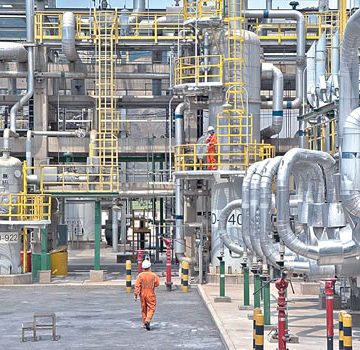How Dangote Refinery will drive world crude oil refining capacity – OPEC

Motolani Oseni
The The organisation of Petroleum Exporting Countries (OPEC) is upbeat at the prospect of the Dangote Oil Refinery serving to drive world crude oil refining capacity increase especially in Africa by 2020.
The organisation in the current edition of its World Oil Outlook (WOO), said that the Dangote refinery, which is the first privately owned and operated a refinery in Nigeria will refine as much as 650,000 barrels of crude oil per day at installed capacity.
Presently, total world oil production in 2019 averaged 80,622,000 barrels per day. Approximately 68 per cent is coming from the top ten countries and an overlapping 44 per cent comes from the fourteen current OPEC members.
OPEC said in the outlook that the world is expecting some capacity expansion coming from Nigeria in Nigeria by 2020, either through the rehabilitation of existing refineries – in part to raise their utilisation rates, or through grassroots projects, like the Dangote Oil Refinery.
OPEC stated: “Last year’s World Oil Outlook hinted that, in Africa, “new projects could improve the situation somewhat toward the end of the period”. This year, increasing confidence that the Dangote project in Nigeria will go ahead is indeed changing the picture.
“Allowing for some uncertainty in the project’s start-up timetable, incremental potential in Africa is expected to continue to lag incremental demand-based requirements through 2020, after which the potential is for a balance or excess requirements.
“A deficit of around 0.2 million barrels per day (mb/d) from 2019 to 2020 is estimated to swing to an excess of around 0.3 mb/d by 2022 to 2023. It must be borne in mind that this regional outlook is unusual in that it hinges largely on a single project”.
OPEC said the completion of the project would reduce the importation of petroleum products in West Africa.
“Since the project is in West Africa, its implementation does not necessarily alter the situations in North and East/South Africa.
What should happen, especially in West Africa, is a reduction in the need and opportunity for product imports,” it added.
According to OPEC, in Africa, there are some 50 listed refining projects, which, if all built, would add nearly 5mb/d of new refining capacity to the continent.
The organisation noted, however, that in recent WOOs, the proportion of projects considered firm has generally been low, for example, 0.4 mb/d for 2017 to 2022 period in WOO 2017.
“This year, the outlook represents a significant reversal from recent history. For the first time in many years, projected firm additions at 1.1 mb/d exceed regional demand growth for 2018 to 2023 at 0.7 mb/d.
“This change relates primarily to one project in Nigeria now under construction. Recognizing that this one major project is in West Africa, the prospects for North and East/South Africa continues to be for further increases in regional net product imports.
“It must be borne in mind that this regional outlook is unusual in that it hinges largely on a single project.
Moreover, since the project is in West Africa, its implementation does not necessarily alter the situations in the North and East/South Africa.
What should happen, especially in West Africa, is a reduction in the need and opportunity for product imports”, it stated.








